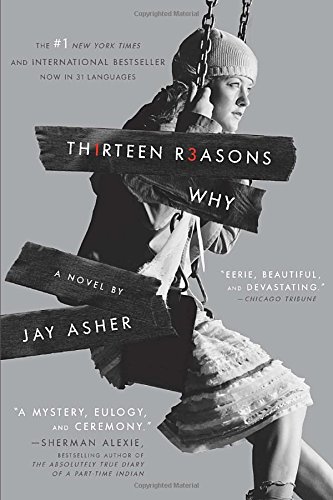All Nonfiction
- Bullying
- Books
- Academic
- Author Interviews
- Celebrity interviews
- College Articles
- College Essays
- Educator of the Year
- Heroes
- Interviews
- Memoir
- Personal Experience
- Sports
- Travel & Culture
All Opinions
- Bullying
- Current Events / Politics
- Discrimination
- Drugs / Alcohol / Smoking
- Entertainment / Celebrities
- Environment
- Love / Relationships
- Movies / Music / TV
- Pop Culture / Trends
- School / College
- Social Issues / Civics
- Spirituality / Religion
- Sports / Hobbies
All Hot Topics
- Bullying
- Community Service
- Environment
- Health
- Letters to the Editor
- Pride & Prejudice
- What Matters
- Back
Summer Guide
- Program Links
- Program Reviews
- Back
College Guide
- College Links
- College Reviews
- College Essays
- College Articles
- Back
Thirteen Reasons Why by Jay Asher
The innovative tale featuring the mysterious suicide of Hannah Baker has captured the hearts of millions abroad. As an authoritarian of moralizing mental illnesses, one would suggest an informative lesson would leave the reader with closure, indicating that the death of Hannah Baker was unnecessary and is not a quick fix for her obstacles. Yet, author, Jay Asher, fails to assert young adolescents with proper education, leaving the reader captivated by the idea that suicide is always the answer.
Asher’s novel is told from the perspective of Clay, a character who received a box of cassette tapes, which he later finds out are recordings by Hannah explaining the logic behind abruptly taking her life. Eventually, the reader finds out thirteen boxes filled with the cassettes were sent to the thirteen characters who she believed triggered her death. Though the reasons are ingenuous, she is no different than other problematic teens. Mild issues such as drifting from her best-friend, being stood up on a date, and not getting compliments on her new haircut are all relatable issues individuals endure while growing up. She even admits “I know. I know what you’re thinking. As I was telling the story, I was thinking the same thing myself. A kiss? A rumor based on a kiss made you do this to yourself? No. A rumor based on a kiss ruined a memory that I hoped would be special. A rumor based on a kiss started a reputation that other people believed in and reacted to. And sometimes, a rumor based on a kiss has a snowball effect” (Asher 60). Contrary to what Hannah argues, she not once accepts she needs help from others while blaming those for obligating her a ‘picture perfect’ life.
Essentially, supplying this moral enlightens readers to dissect flaws in not only others, but their personal lives. By placing oneself in a bubble of pity, seeing reality’s arduous struggles can be nonsensical. Hannah exemplifies this when she peers out of a closet, watching her once best friend, Jessica, get raped. As she stands startled, she does nothing to intervene and even gets envious at the thought of her friend getting attention from a male. Not once does is there is a realization for how lucky Hannah Baker is compared to the large majority of teenagers enduring climatic experiences. She was not raped, her family was stable, and she excelled academically. Her ‘life-changing tragic circumstances’ were brought upon herself from isolation and blame and yet she states, “For the longest time, from almost day one at this school, it seemed like I was the only one who cared about me” (Asher 211). As the reader, feeling sympathetic for Hannah is inevitable. Blaming those for her own death is far crueler than petty high school drama. Therefore, the romanticized suicide exemplified in Thirteen Reasons Why, can be triggering and dangerous for teenagers enduring societies difficulties.
Similar Articles
JOIN THE DISCUSSION
This article has 0 comments.

